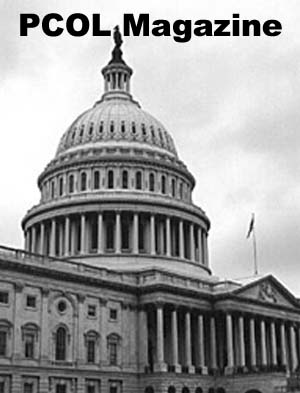July 3, 1991: Headlines: GAO: Health Care: Safety and Security of Volunteers: GAO: Long Needed Improvements to Volunteers' Health Care System
Peace Corps Online:
Peace Corps News:
Library:
Peace Corps: Safety and Security of Volunteers:
Peace Corps and Safety and Security of Volunteers:
July 3, 1991: Headlines: GAO: Health Care: Safety and Security of Volunteers: GAO: Long Needed Improvements to Volunteers' Health Care System
Long Needed Improvements to Volunteers' Health Care System

Long Needed Improvements to Volunteers' Health Care System
Long Needed Improvements to Volunteers' Health Care System
Report to the Honorable Daniel K. Inouye, US Senate
July 3, 1991
The Honorable Daniel K. Inouye
United States Senate
Dear Senator Inouye
This report responds to your request that we review the Peace Corps' health care system for volunteers. In response to problems we identified during our review, the Peace Corps has initiated efforts to improve (1) the quality of care for volunteers during their service and (2) the assistance provided to former volunteers with service-related medical conditions. We recommend that the Director of the Peace Corps follow through on these efforts and also ensure that former volunteers are informed of their health care benefits.
We are sending copies of this report to the Director of the Peace Corps and to other interested parties. Copies will be made available to others on request.
Please contact me at 202-275-5790 if you have any questions concerning this report. The major contributors are listed in appendix I.
Sincerely yours,
Harold J. Johnson
Director, Foreign Economic Assistance Issues
Purpose:
Peace Corps volunteers, many of whom work in impoverished countries that have poor health conditions, face a myriad of illnesses and injuries associated with their work. They depend on the Peace Corps to provide them with health care.
Senator Daniel K. Inouye asked GAO to review the adequacy and responsiveness of the Peace Corps' system for providing care to volunteers. GAO's objectives were to determine whether the agency's policies and procedures ensured that () volunteers received a level of health care comparable to what they would receive in the United States and (2) former volunteers with service related medical conditions were aware of and receiving their health care entitlement.
Background:
The Peace Corps Act of 1961 stipulates that volunteers receive health care during their service and health care benefits after they leave the agency for service related medical conditions. Under the guidance of the Office of Medical Services, medical officers are expected to provide care to volunteers - including preventative and primary health care - that as closely as possible approximates the level of care available in the United States. Medical officers also are required to inform volunteers of the post-service benefits to which they are entitled under the Federal Employees Compensation Act (FECA). The Office of Medical Services must help former volunteers with service-related health problems file a claim for these benefits.
By the 1980's the Peace Corps had replaced most US trained physicians with registered nurses, most of who were foreign-trained, for its medical officer positions. The Peace Corps' decision to switch to foreign-trained nurses was made for reasons of economy, lack of available doctors, and to employ more host country nationals.
Results in Brief:
Although most volunteers and former volunteers contacted by GAO were satisfied with the quality of health care provided by the Peace Corps, GAO's review disclosed that the Peace Corps' health care system did not ensure that volunteers received a standard of care that closely approximated the level of care available in the United States. Furthermore, the agency did not have reliable and systematic data to know what quality of care was being provided. The capabilities of medical officers were not evaluated, and they received insufficient training and guidance from the Peace Corps. The health care system had not been subjected to a medical review by an independent accrediting organization comparing the quality of care provided against US standards. Because the Peace Corps had an inadequate health care system, volunteers sometimes received an inferior level of health care.
In addition, a GOA survey showed that from 10 to 30 percent of former volunteers had medical problems related to their Peace Corps service, and of these about half had not filed a FECA claim for their problem. Some were unaware of these benefits and some had used their private insurance to cover medical expenses. Others who had sought help in filing a claim said they received inadequate assistance from the Office of Medical Services.
The Peace Corps began to correct many of these problems as a result of GAO's review, and some corrective actions, such as improving the FECA system, and providing funds for medical officer orientation, had received Peace Corps attention before GAO's review. Although is was too early to assess whether these actions would correct all the long-standing problems, GAO was encouraged by the agency's response to them.
Principal Findings
Peace Corps' System Inadequate to Ensure a US Standard of Health Care
GAO's survey of former volunteers showed that 73 percent were satisfied with the quality of health care that medical officers provided. Nonetheless, GAO found that the agency's policies and procedures for hiring and training its medical officers, as well as for monitoring their activities, were insufficient. For example:
the Office of Medical Services did not test or otherwise assess its medical officers' ability to provide the required level of care;
the scope of care that medical officers should be competent to provide had never been defined;
orientations were not required for new medical officers;
continuing medical education conferences were sporadic and too short to provide critical health care training and guidance to the medical officers; and
in-country evaluations, the primary mechanism for monitoring the quality of care provided to volunteers, were conducted at 2-year intervals or longer and were sometimes incomplete.
As a result of these and other deficiencies, some of the medical officers contracted by the Peace Corps (1) may not be qualified to provide the level of health care required by the specific conditions of a country, (2) were unfamiliar with or untrained in the Peace Corps' diagnostic and treatment procedures, and (3) provided care that was beyond their competence or did not follow Peace Corps guideline. For example, two medical officers from Latin America had performed, without any training, pap smears on volunteers for 2 years. In addition, GAO's analysis of medical fiels showed many violations of the Peace Corps' health care guidelines, as well as instances of incorrect diagnosis and treatments. Peace Corps official agreed that some of these problems could persist for months or event years before being discovered.
Health Care System Had Never Received an Independent Medical Review
Unlike the health care systems for the Department of Defense, the Department of Veterans Affairs, and the National Institutes of Health, the Peace Corps' health care system had never been reviewed by an independent agency such as the Joint Commission on Accreditation of Healthcare Organizations. Such reviews are common in the health care industry as a method of ensuring a uniformly high standard of care. The Joint Commission, for example, certifies most US hospitals after comparing their services with national health care standards.
Inadequate FECA Assistance Provided to Some Former Volunteers
Because medical officers were not adequately trained on FECA benefits, many former volunteers were not aware of their post-service health care entitlement. Our survey of former volunteers showed that from 10 to 30 percent of former volunteers had medical problems related to their Peace Corps service, and about 50 percent had not filed a FECA claim. The survey also showed that from 48 to 68 percent had not received information about their FECA benefits. Former volunteers who had requested assistance from the Office of Medical Services in the past 2 years generally indicated that the assistance was adequate, possibly reflecting improvements in the Peace Corps' FECA program during this period. Former volunteers who had left the Peace Corps prior to this period generally said the assistance was not adequate.
Planned Improvements to the Peace Corps' Health Care System
The Office of Medical Services began to improve its health care system as a result of GAO's findings. These initiatives included (1) a 4-week orientation for all new medical officers, (2) annual training conferences, (3) a quality assurance program to improve health care monitoring and service delivery, and (4) an independent medical review.
In addition, the Office of Medical Services has taken a number of steps in response to problems GAO identified. These include (1) ensuring Office of Medical Services concurrence on the selection of medical officers, (2) institution of a new monitoring form designed to emphasize quality-of-care issues, and (3) development of a video to better inform current volunteers of their post-service health care benefits. Also, improvements to the Peace Corps' management of its FECA program, instituted prior to GAO's review, should help to alleviate some of the post-service problems voiced by former volunteers.
Recommendations
GAO recommends that the Director of the Peace Corps
follow through on the initiatives announced and those it has begun to implement, including a plan to institute an independent evaluation by the Joint Commission on Accreditation of Healthcare Organizations or a similar organization, to improve the Peace Corps' health care system and
require that all former volunteers be informed of their post-service health care benefits.
Agency Comments
Peace Corps program officials provided oral comments on this report, and their comments have been included as appropriate. Peace Corps officials generally agreed that the agency's system was inadequate for ensuring that volunteers received a level of care that approximated the care available in the United States. However, they stated that despite the health care system deficiencies identified by GAO, and being acted upon the Peace Corps, the actual quality of care provided to volunteers was good. They pointed to GAO's survey of former volunteers, most of who reported satisfaction with the health care they had received, as evidence.
GAO did not assess the overall quality of care the Peace Corps provided to its volunteers, but instead evaluated the adequacy of the Peace Corps' system for ensuring that its own medical guidelines were followed. GAO found, and the Peace Corps agreed, that its system could not provide this assurance. Furthermore, GAO found sufficient evidence of incorrect diagnoses and treatment that resulted from noncompliance of the Peace Corps' health care guidelines to conclude that improvements were needed in the agency's management of its health care program.
When this story was posted in October 2004, this was on the front page of PCOL:
 | Director Gaddi Vasquez: The PCOL Interview
PCOL sits down for an extended interview with Peace Corps Director Gaddi Vasquez. Read the entire interview from start to finish and we promise you will learn something about the Peace Corps you didn't know before.
Plus the debate continues over Safety and Security. |
 | Schwarzenegger praises PC at Convention
Governor Schwarzenegger praised the Peace Corps at the Republican National Convention: "We're the America that sends out Peace Corps volunteers to teach village children." Schwarzenegger has previously acknowledged his debt to his father-in-law, Peace Corps Founding Director Sargent Shriver, for teaching him "the joy of public service" and Arnold is encouraging volunteerism by creating California Service Corps and tapping his wife, Maria Shriver, to lead it. Leave your comments and who can come up with the best Current Events Funny? |
Read the stories and leave your comments.

Some postings on Peace Corps Online are provided to the individual members of this group without permission of the copyright owner for the non-profit purposes of criticism, comment, education, scholarship, and research under the "Fair Use" provisions of U.S. Government copyright laws and they may not be distributed further without permission of the copyright owner. Peace Corps Online does not vouch for the accuracy of the content of the postings, which is the sole responsibility of the copyright holder.
Story Source: GAO
This story has been posted in the following forums: : Headlines; GAO; Health Care; Safety and Security of Volunteers
PCOL13492
97
.





